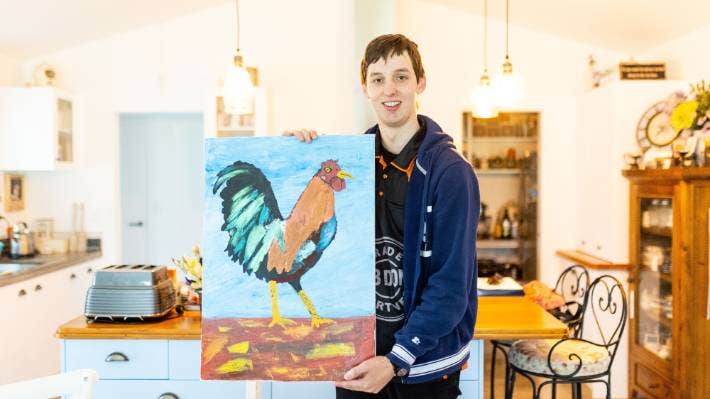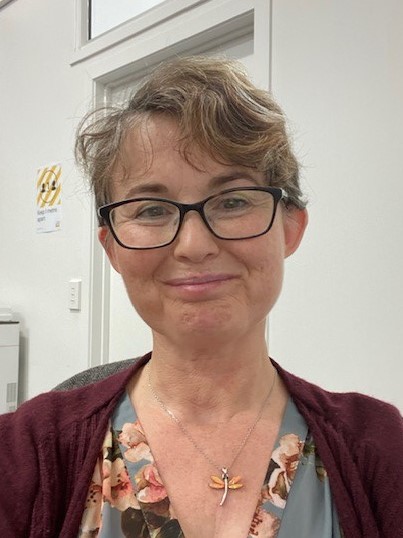
By Helen Harvey, Taranaki Daily News/Stuff, Dec 4, 2021.
One of the paintings is of a rooster. Another is a detailed and mesmerising picture of a bridge. And there are drawings of futuristic buildings, with rows and rows of tiny windows, all the same shape and size.
Zak Wilkojc, 23, also draws terrain maps. Large ones. One of his maps still hangs on the wall of the secondary school he attended in Norway.
In a perfect world, or even one where all things are equal, Zak would be an architect.
He’d be beginning his career designing buildings for people and businesses not doing drawings for an imaginary city on Minecraft, a computer game where people create and build their own worlds.
But in Zak’s world maths doesn’t exist. And he reckons that’s ‘‘destroyed’’ his architect dream.
Zak, who was born in Whanganui and grew up in New Zealand, Australia and Norway, has a few challenges, including autism and severe dyslexia, along with some physical health issues.
Autism is a neurodevelopmental condition that affects how people perceive the world, how they think and behave, and how they communicate and interact with others. It presents differently in everyone affected.
Dyslexia is a learning disability that confuses the order of letters in words making reading and writing difficult. It can be genetic.

By the time Anna and Jarek Wilkojc adopted Zak from a foster home when he was six months old he was neglected and malnourished, Anna says.
‘’We knew his mother was on drugs and alcohol. She was swearing that it was only three months, but the first three months are vital. He went through a lot.
‘’I stopped working when we found out he’s got problems. We knew that I will have to be 100 per cent for him – from doctor to doctor from diagnoses to diagnoses.’’
The Wilkojcs are Polish, but met in Australia, Anna says.
“We moved back to Australia when Zak was 6, because of my husband’s work and from then on we started travelling, everywhere the job took us. My husband would take a job only if we could have a good school for Zak.’’
Anna never stopped looking for better things for Zak to do, learn from and be involved in.
At primary school in Western Australia Zak got beaten up and in the Wilkojcs didn’t think the system was working for him, so they moved across country to Coffs Harbour. When they were looking at moving to Norway they checked out the school, which was amazing, before they accepted the job, she says.
Zak studied art in Australia and did some courses at Witt in New Plymouth.
‘’Witt were not able to provide assistance for him and any course that Zak could do he would have to have someone to help with his dyslexia. To help him out. He wouldn’t be able to keep up with the lecturer with the notes. His writing is very, very slow, it’s just a lot of stress for him.’’
But he’s learned something from every course and programme he’s done and Anna would like to find some more courses for Zak.
Over the years Anna’s found it hard that Zak can’t get to where other kids can.
‘’Every little thing Zak has to do takes so much longer and it’s so much more difficult for him. And sometimes he still can’t do that which everybody else takes for granted. He would love to be an architect and we all know it’s not going to happen.’’
That realisation led Zak to some dark places mentally. But there was an upside to that. He was able to work with Pathways Health Ltd in Hāwera and over 12 months they helped him study for the theory part of his driver’s licence.
He was allowed to get three answers wrong – he missed two. Getting his licence was something the family thought he would never be able to do.
Driving gives Zak freedom, he says. ‘’It makes me more happy.’’
And now Zak has had more success and got himself work at Masters Mitre 10 in Stratford.
Research commissioned by Workbridge, an organisation that works with disabled people to get employment, in 2016 shows New Zealand is missing out on more than $1 billion in tax alone by not encouraging disabled people into work or boosting the involvement of those struggling with underemployment.
But, Zak is one of the lucky ones.
It was really exciting getting the job, he says.
‘’I bring stock from the shelves forward. Restocking the shelves, serving customers, helping customers, doing deliveries.’’
But sometimes the maths thing rears its head. Zak can’t add up, so he has a colleague to help at the till, so it’s usually all good, he says.
He would like people to not judge him.
‘’When some customers come up to me and start swearing and being impatient and stuff like that I get nervous and frustrated.’’
‘’It’s funny’’ because those same customers could be really nice one day, but the next day they’ll come in and say hurry up if he has to count,” he says.
“Or they say the name of their account and they spell it out too fast for Zak to keep up.
Masters Mitre 10 owner Richard Masters said a previous manager, who has since retired, had a good feeling about Zak.

’He was here on work experience to start with, on a fixed contract. Then it all worked out well, the staff really like him. He’s very affable. He initially started working 10 hours a week to see how it was going with the agreement we would increase it up to 15.’’
Whenever he’s got cash he asks for someone to check what he’s doing, Masters says.
‘’I feel he’s very good at asking for assistance when he feels that he needs it. That’s good. He’s supported by the other staff on the shop floor.’’
He does need to have a bit more time spent with him, Masters says.
‘’But I don’t mean that in a bad sense. He seems to really enjoy it. He has set tasks he does each week, so he has a routine. And it gives him structure.’’
Masters has often been asked or people to come in for work experience, and he always say yes, he says.
‘’Workbridge just rang up, so we said yes.’’
Workbridge Taranaki Employment consultant Nichola Lobban says she first looked at jobs where Zak could potentially end up getting an apprenticeship.

‘’They wanted to explore some creative options to see what he could do rather than just getting shunted into a role he didn’t really like.’’
Zak went through Workbridge’s enrolment process, which includes a job plan, creating a CV, learning interview skills.
Everyone on Lobban’s book have challenges whether that’s an intellectual disability, anxiety or depression, or a physical disability.
‘’We have quite a few people with anxiety at the moment. That’s around the country. People with long term illnesses. Some people have worked all their lives and have had a stroke or heart attack and can’t do as much any more. People with autism. It’s really broad.’’
At the moment Lobban has 49 people on her books aged from 16 to 64. About 32 in the job search phase and others in post placement support like Zak who ‘’I catch up with on a monthly basis.’’
Finding jobs it is really difficult, she says.
‘’There are jobs out there but if you look at the job ad they’re wanting people who are really fit and able-bodied. And often that automatically excludes a lot of our people.
“Or you have to have your full class 1 licence even if it might not be that relevant to the job. Sometimes an employer really wants to help but they don’t have the time, or people have to go through an online process.”
Other people straight off assume everyone Workbridge assists has an intellectual disability and they don’t time for that.
“It’s disappointing,” says Lobban. “There are a lot of assumptions out there.’’
- This story was originally published in the Taranaki Daily News and on Stuff.
